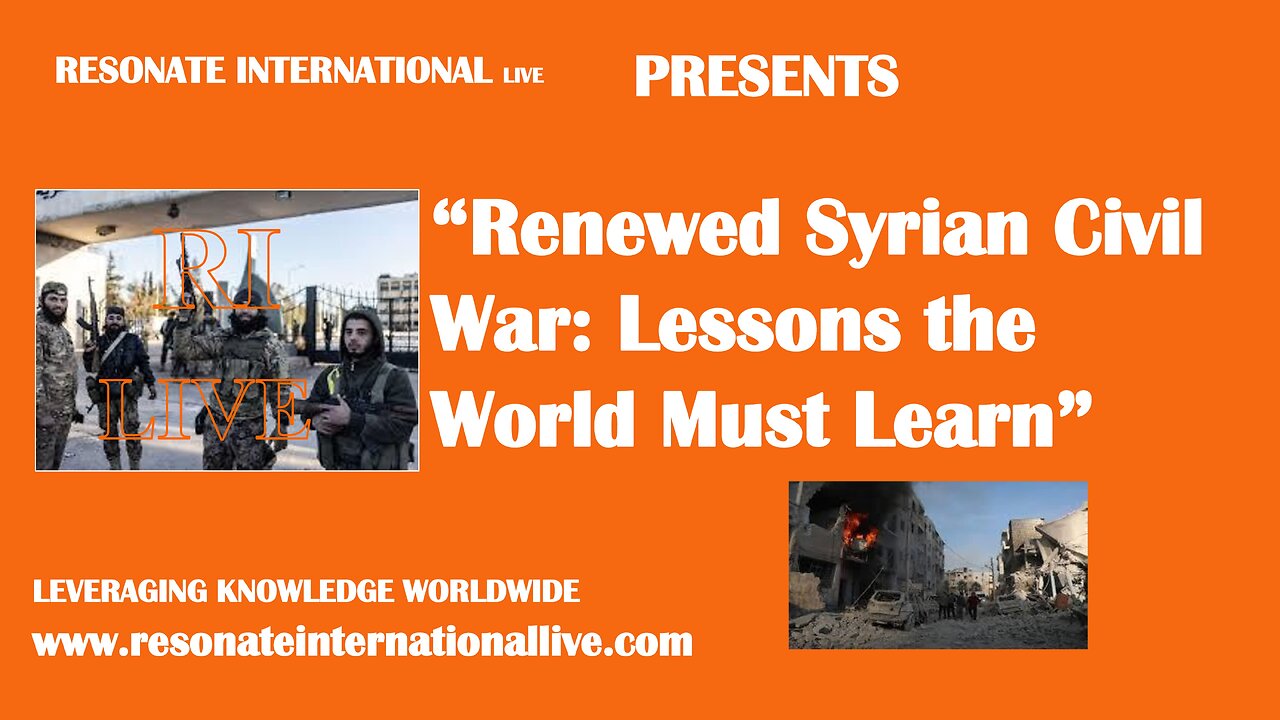Premium Only Content

“Renewed Syrian Civil War: Lessons the World Must Learn”
The Syrian Civil War, now spanning over a decade, stands as a profound reminder of the devastating consequences of unresolved conflict, fractured governance, and global inaction. What began as peaceful protests during the Arab Spring of 2011 quickly devolved into a multi-faceted war involving sectarian divisions, competing rebel groups, and global powers vying for influence. The Assad regime’s iron-fisted response, compounded by foreign interventions, turned Syria into a proxy battlefield. From 2012 onward, countries such as the U.S., Russia, Iran, and Turkey pursued divergent goals, escalating the conflict. By 2015, the involvement of ISIS and other extremist groups added new dimensions to the crisis. While ISIS’s territorial defeat in 2019 was celebrated, its resurgence in pockets of Syria continues & serves as a warning of unresolved ideological and governance issues. Iran’s support for the regime through funding and militias like Hezbollah has also entrenched its influence in the region very significantly. Economic sanctions intended to pressure the regime primarily harmed ordinary Syrians, with 90% of the population now living below the poverty line. With over half a million lives lost, 14 million displaced, and an economy reduced by over 60%, Syria’s tragedy reflects profound geopolitical and humanitarian failures. Humanitarian aid, while significant, was insufficient and often misdirected. Between 2011 and 2023, over $40 billion in humanitarian assistance was pledged globally, but logistical challenges and corruption hindered effective distribution. Meanwhile, early diplomatic efforts to foster a political resolution were side-lined by militaristic strategies.
-
 59:59
59:59
The StoneZONE with Roger Stone
12 hours agoAfter Years of Targeting Trump, FBI and DOJ are Unprepared to Stop Terror Attacks | The StoneZONE
79.3K28 -
 1:26:42
1:26:42
Leonardaisfunny
10 hours ago $5.81 earnedH-1b Visas: Infinity Indians
52.9K28 -
 1:08:33
1:08:33
Josh Pate's College Football Show
15 hours ago $3.22 earnedPlayoff Reaction Special: Ohio State Owns Oregon | Texas Survives | UGA vs Notre Dame Takeaways
46.3K6 -
 58:04
58:04
Kimberly Guilfoyle
15 hours agoFBI's Terror Response Failures, Live with Steve Friend & Kyle Seraphin | Ep. 185
118K48 -
 2:15:01
2:15:01
WeAreChange
15 hours agoMassive Developments In Vegas Investigation! UNREAL DETONATION, Shocking Details Emerge!
123K89 -
 54:02
54:02
LFA TV
22 hours ago2025 Is Off to a Violent Start | TRUMPET DAILY 1.2.25 7pm
55.6K12 -
 59:27
59:27
theDaily302
21 hours agoThe Daily 302- JJ Carrell
46.8K5 -
 2:57
2:57
EvenOut
2 days ago $2.21 earnedTHE TELEPORTING PORTA POTTY TWIN RPANK!
42.6K3 -
 1:02:55
1:02:55
In The Litter Box w/ Jewels & Catturd
1 day agoAmerica Is Under Attack! | In the Litter Box w/ Jewels & Catturd – Ep. 711 – 1/02/2025
107K167 -
 1:45:25
1:45:25
The Quartering
18 hours agoHuge Update In Cybertruck Attack & Dark New Details From New Orleans Attacker & More!
137K72